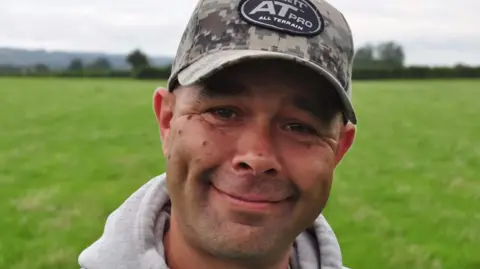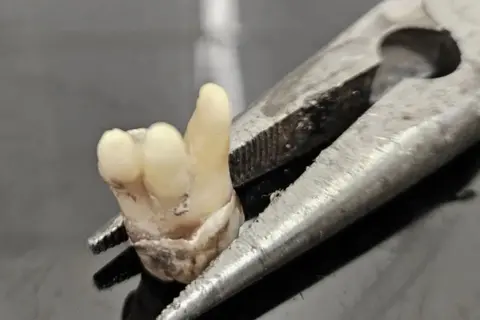Man's tooth pulled out by pliers intrigues museum
 Chris Langston
Chris LangstonA man who pulled out his own tooth with pliers after struggling to get an NHS dental appointment has been approached by a museum which wants to put a copy on display.
Chris Langston from Oswestry, removed the molar last February after enduring, he said, months of agony.
He said an artist working with Barts Pathology Museum had got in touch with a view to scanning the tooth so it could be compared with teeth from the 19th Century - a request he described as "bizarre".
But he added he was pleased a little bit of himself would be "donated to medical science", calling the achievement "kind of a bucket-lister".
Once scanned, the real tooth is to be returned to him, with a facsimile going on display.
The museum - which documents medical school history - has been contacted for comment.
 Chris Langston
Chris LangstonHe said removing a tooth with pliers was not something he recommended other people to try and "wasn't my proudest moment".
But he said "the pain was unbearable" at the time and removing the tooth had eased it immediately.
Professionals have previously warned against people pulling out their own teeth, citing a list of risks.
At about the time Mr Langston went DIY, then-prime minister Rishi Sunak admitted it was "too difficult" to get access to an NHS dentist.
Mr Langston said Barts Pathology Museum wanted to scan his tooth with lasers "to look through the tooth to see how diseases and things have changed" over the centuries.
In return, he said, he had been promised a fist-sized copy to keep.
He said after pulling out the offending tooth it "went into one of my little jars with beads", adding he had no trouble posting it off to researchers.
Hopefully, he added, it would become "a learning aid for people interested in dentistry".
Follow BBC Shropshire on BBC Sounds, Facebook, X and Instagram.
